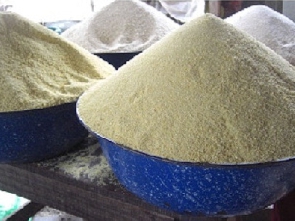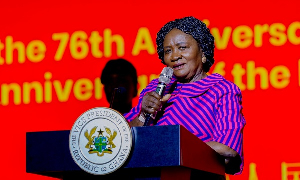During our school days " Gari" was indeed the the saviour of many Ghanaian students. It was a very essential commodity no student in boarding school could afford to miss. It was life in itself.
It gave us the chance to make friends and share with those who did not have. It filled our stomachs with nourishment, strength and energy to do the rigorous learning our school work demanded.
Gari gave us hope that, if we did something wrong we could pacify our " seniors" or " benefactors" or " colonial masters". Gari also helped us to settle old scores with friends and loved ones.
Gari, was so essential that, if you lacked it, and ate some other foods like " Ewor" " tom brown" "corn flour " you could attract wild guy names at school. Gari was the standard and by any means necessary the must have commodity in the suitcases or " trunk " of each student.
At home, Gari was a very staple food present at many meals and made it possible to feed the many hungry mouths, children, parents and friends.
At parties and many celebrations, Gari could be prepared in different ways mixed with different spices that gave us the kind of aroma and taste you will never forget.
In the market, Gari offered employment to some of our mothers who took the Gari trade seriously and traveled to towns like Jemerni, Sogakorfe, Kpandu, Logba, Vakpo, Golokwati, Alavanyo, Teteman, Vane, Amedzofe, Fume, Hohoe, Ho, Tanyigbe, Taviefe, Have, Peki, Tafi, Likpe, Dzokpe, Anfoega, etc. for cheaper prices.
Gari has and continues to play a very crucial role in many of our socioeconomic engagements, yet has not had the preeminence that should be accorded it like other staple Ghanaian Foods - Fufu, Banku, Kenkey, or Rice, etc,
Today, in my little home in Canada, far from the Mother Land Ghana, I am feeling for some gari. As I was trying to prepare it, and as my boys jumped unto Cheerios, Cinnamon Toast Crunch, Timbits, Honeycombs, Cornflakes, Oatmeal Crisps, Quicker Oats and other cereals in the kitchen produced by Kellogg, I began to wonder who started " Gari", how has such an important food staple in our Ghanaian diet, has not been very much exposed to the world like the other cereals in my kitchen.
I believe " Gari" has the power to transcend Ghana, Nigeria and beyond.....I hope I am not too optimistic. But that said, I have began to see Gari being packaged nicely into well designed containers and sold in many African shops across the Western World and the Caribbeans - thus, a delicacy for many Africans wherever they are found.
Gari has the potential to generate high Foreign Exchange for the Ghanaian economy and many West African countries if the industry is properly managed as large quantities of Cassava exist in this region - which is the main ingredient for making Gari. And also possibly a great mean of producing starch for industrial purposes.
Indeed, Gari, is a multi purpose commodity that is important to student's survival at school but also critical to generating great economic wealth for Ghana and beyond.
Opinions of Monday, 27 July 2020
Columnist: Kordson Kwasi Ayrakwa
Gari, the saviour of the Ghanaian student
Entertainment














